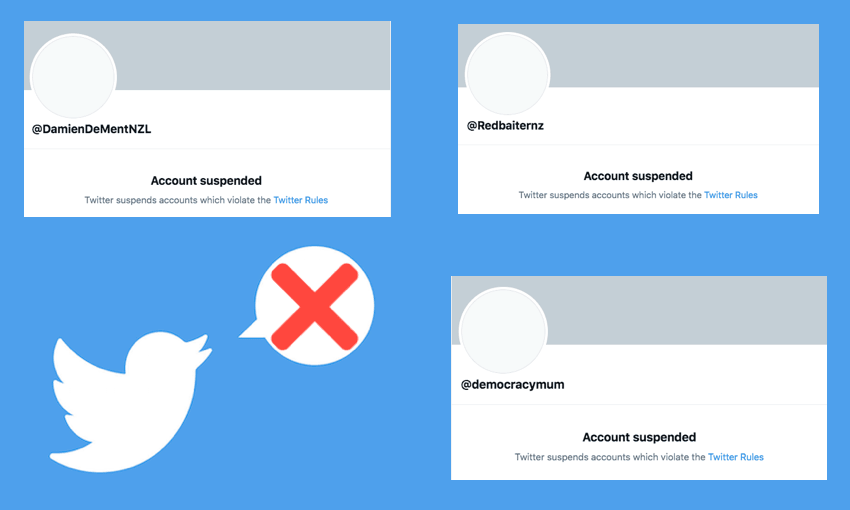Several prominent Twitter users on the fringe of right-wing politics in New Zealand have had their accounts suspended amid a wider clampdown by the social media giant.
Twitter has suspended the accounts of several prominent members of the right-wing fringe of New Zealand politics, amid a broader crackdown following last week’s US Capitol riot.
The list included some household names for the extremely online, including the pseudonym-using DemocracyMum and Redbaiter – two personalities who have been posting on a range of forums for more than a decade.
Among users who posted under their real names, the list included conspiracy theorist Vinny Eastwood, who was paid to promote the Advance NZ party during the election campaign, former Act party board member and candidate Stephen Berry, and prominent NZ-based Trump supporter Damien De Ment.
The purge of accounts has been taking place worldwide, and those in New Zealand might have been caught up as fellow travellers of more prominent figures in the United States. Some in that space who have not had accounts suspended are now complaining they have lost hundreds of followers as a result.
As of yesterday, Twitter said more than 70,000 accounts worldwide had been suspended, in connection to sharing content associated with the QAnon conspiracy theory. The purge has also included a permanent Twitter ban for outgoing US President Donald Trump, on the grounds of sharing election and Covid-19 misinformation, and inciting violence – violations of the platform’s terms of service.
The riot at the US Capitol – which some commentators are describing as closer to an insurrection or attempted coup – left five people dead, including a police officer who died of wounds after being beaten up by protesters, and a protester who was shot and killed by police. There is evidence to suggest some protesters planned to round up and murder Democratic Party legislators. Several bombs were also found around Washington DC on the day.
De Ment was an enthusiastic supporter of events happening in Washington DC, describing the protesters as “patriots” and celebrating their actions. He did not respond to a request for comment.
Left-wing activist Byron C Clark, who has long engaged head on with some of the accounts that have been suspended, said he’s pleased to see social media companies “taking some responsibility”.
“Free speech doesn’t mean the right to have your speech published by a private platform,” he said.
Clark said there are clear links between online demonisation and radicalisation, and real-world violence later being carried out. “It’s no coincidence that we’ve seen a 250% increase in far-right terror attacks over the past five years while at the same time xenophobia and conspiracism has spread through social media.”
“I’m disappointed it took an insurrection in the US to make them act,” he said. “This could have been done after Heather Heyer’s death at the Unite The Right rally in Charlottesville in 2017, or after 51 Muslims were murdered in my home town in 2019.”
The wider international crackdown hasn’t necessarily been limited to QAnon and pro-Trump figures. Among other suspensions, several accounts connected to the Red Scare podcast – which occupies an extreme fringe of the heavily online world of the “Dirtbag Left” – have also been taken down in recent days.
The suspensions have sparked debate about the responsibilities of private platforms like Twitter around free political speech. While some see it as a worrying overreach by a private company into the political arena, others argue that Twitter is under no obligation to provide anyone with a platform, particularly if they are concerned about the consequences of what gets said.
Thomas Beagle, chairperson for the NZ Council for Civil Liberties, said it was a complicated issue for platforms like Twitter, both legally and politically.
“While it’s tempting to say Twitter and Facebook are private businesses and can do whatever they like, we need to recognise that their near monopoly status as the places where political issues are discussed also gives them some responsibilities to freedom of expression,” said Beagle.
However, Beagle said that didn’t mean Twitter had no right to ban users. “Rather I’d like to see them do a better job of being transparent about what they’re doing, and using good processes that allow people to appeal. Too often the actions of the dominant providers seem capricious and arbitrary with no ability to admit that they make mistakes.”

